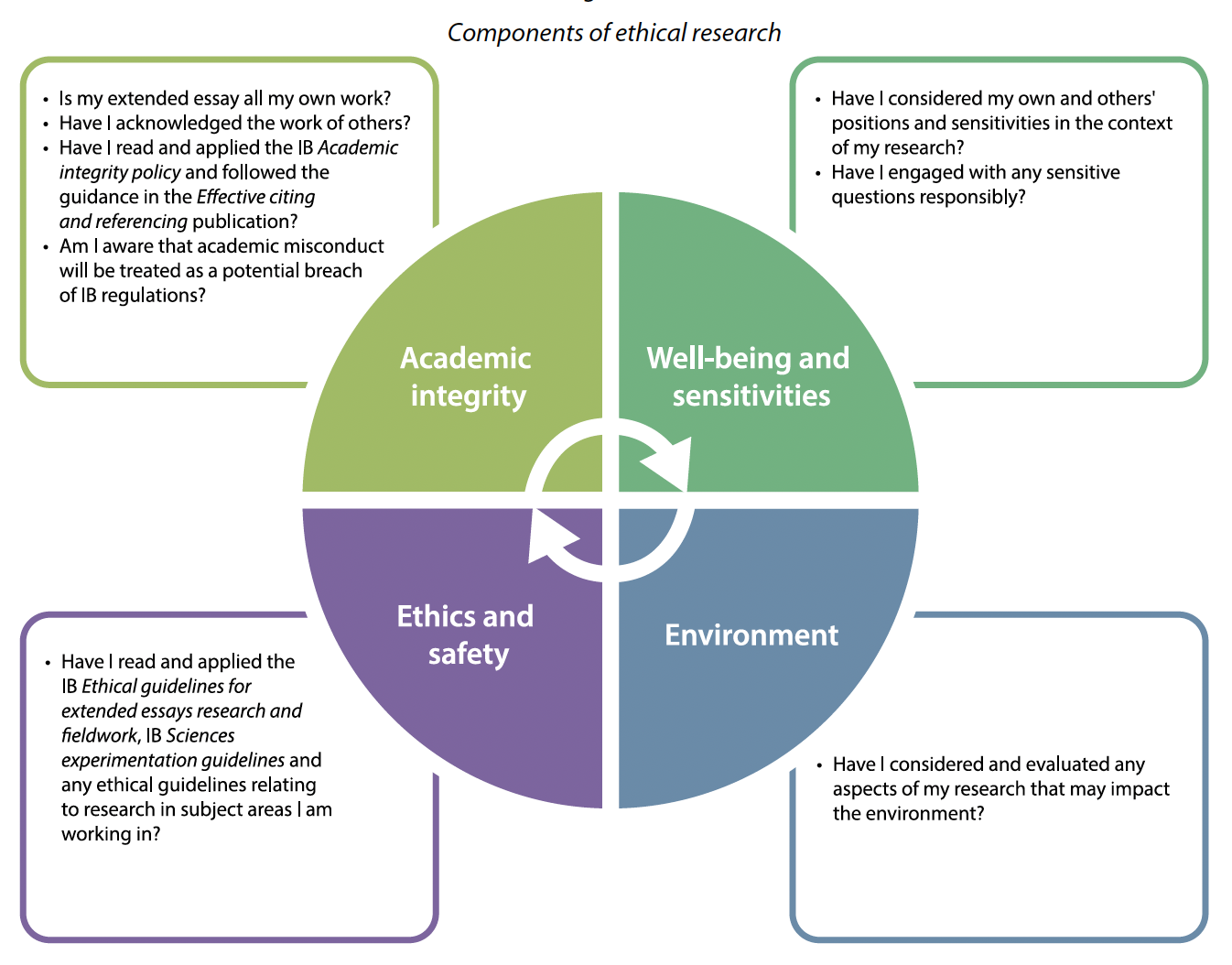

A significant aspect of your extended essay experience is learning about what it means to be an ethical researcher. This important approach and mindset is something that you can take forward with you to future studies, work, and life in general.
Components of ethical research
As shown in the figure below, your capacity to research ethically depends on:

EE Guide pg 93-96
ACADEMIC INTEGRITY
In the world of research, academic integrity is essential. Readers must be able to trust the honesty and the accuracy of the information they read.
The extended essay may be your first step into the world and culture of research. See this as an important learning opportunity, focus well and take what you learn forward to future studies and work contexts. There are several strands to academic integrity in the extended essay.
It is essential that:
In summary, authenticity is fundamentally important to the integrity of your work and your own personal integrity.
Your own work
You may be aware of individuals and websites that offer services ranging from correcting and editing your work to actually writing it for you. If you use these services and present their output as your own, this is dishonest and demonstrates a lack of integrity.
Note also the fine line between using software to check your spelling and grammar or to generate references for your reference list and bibliography, and using software that might write a complete essay when instructed. Most grammar and spell-checking software still requires you to check that its suggestions are correct and acceptable.
Using artificial intelligence (AI) to write an essay that is then presented as your own is dishonest and demonstrates a lack of integrity. Instead, think about how you might use AI software as a tool to help you in your research in a permissible, positive way. For example, material generated by AI can be considered as one of your resources, alongside resources gathered in more conventional ways (e.g., websites, academic articles, books), always acknowledged and cited appropriately. However, it is essential to verify and validate information generated by AI, possibly by corroborating it with data from other sources. Given the capacity of AI to “hallucinate”, it is wise to use more conventional search engines for the investigative stage of your research because these search for and list human-produced content. AI may also be used to help you compare and evaluate other resource materials.
For further guidance on the use of AI, refer to Appendix 6 in the IB Academic Integrity Policy, and the infographic: The IB and Artificial Intelligence Tools.
In summary, be clear that if you are found to have breached IB regulations on academic integrity or ethical research guidelines, you put your diploma at risk.
Your values and skills
As a principled learner:
If you put these ideas into practice, you demonstrate integrity, and your work reflects it—it is authentically your work.
WELL-BEING & SENSITIVITIES
Researching and writing an extended essay provides you with an opportunity to engage with interesting, stimulating topics and issues that are important to you. Nonetheless, sometimes topics and issues can be sensitive for others and personally challenging for you as the researcher. It is highly recommended that you talk with your supervisor and extended essay coordinator in these circumstances. They can advise you on how to approach and engage with a sensitive topic in a responsible manner. The IB’s Ethical guidelines for extended essays research and fieldwork will help you think through these issues and make good decisions.
ETHICS & SAFETY
The Ethical guidelines for extended essays research and fieldwork document will help you to navigate ethical questions and issues by providing guidance relating to such topics as:
Your safety and the safety of others is paramount in research that involves experimentation. The IB Sciences experimentation guidelines is essential reading if an experiment is part of your research plan. The guidelines cover important topics, including:
ENVIRONMENT
As in all aspects of your life, it is essential to be aware of the potential environmental impact of your extended essay research and associated activities. You should evaluate circumstances and take preventative action in relation to aspects such as: